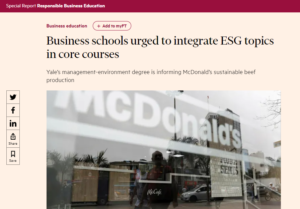The Financial Times has been grappling with questions of corporate responsibility for some time now and the advent of ESG investing has forced it to produce its own version of what “Responsible Business Education” should look like.
Here are a few choice quotes:
“The term the professor used was ‘frame-breaking change’. And what I saw in the world of sustainability and impact investing was potentially frame-breaking change.”
“It’s about pragmatism and using an enhanced analytical process to understand investing.”
“However, while schools have introduced more course content on sustainable business, many are offered only as electives.”
Business schools are faced with the same problem of integrating ESG as companies and their investors. The crux of which is how to simultaneously reconcile the creation of ‘value’ for both the market (i.e. shareholders) and society (all other stakeholders). Conventional business school teaching remains rooted in financial and economic theories that have espoused shareholder value and profit maximisation as central tenets for 50 years. Consequently, ESG presents a fundamental paradigm change where responsible business can no longer be an adjunct to core business strategy.
So, what should business schools do next?
The Maturity Institute has re-framed business education as a new paradigm. Our universal OMINDEX® organisational health diagnostic puts Total Stakeholder Value (TSV) at its heart; where ESG is fully integrated into responsible business, investment strategy and management practice. Our approach is about enabling a transition from shareholders to all stakeholders; where companies, investors, regulators and business schools can adapt current strategies and methods, to integrate them under a common purpose of TSV. MI’s Chair Paul Kearns explains more in a recent Association of MBAs podcast.
Students who have received our teaching have been excited to use it in practice, with several MBA dissertations and PhD’s already completed or in progress. Our OMINDEX® global ESG standard also continues to become more widely used to measure corporations against their Total Stakeholder Value capability.
If you are interested in building a responsible education in business please contact paul.kearns@maturityinstitute.com

Comments are closed